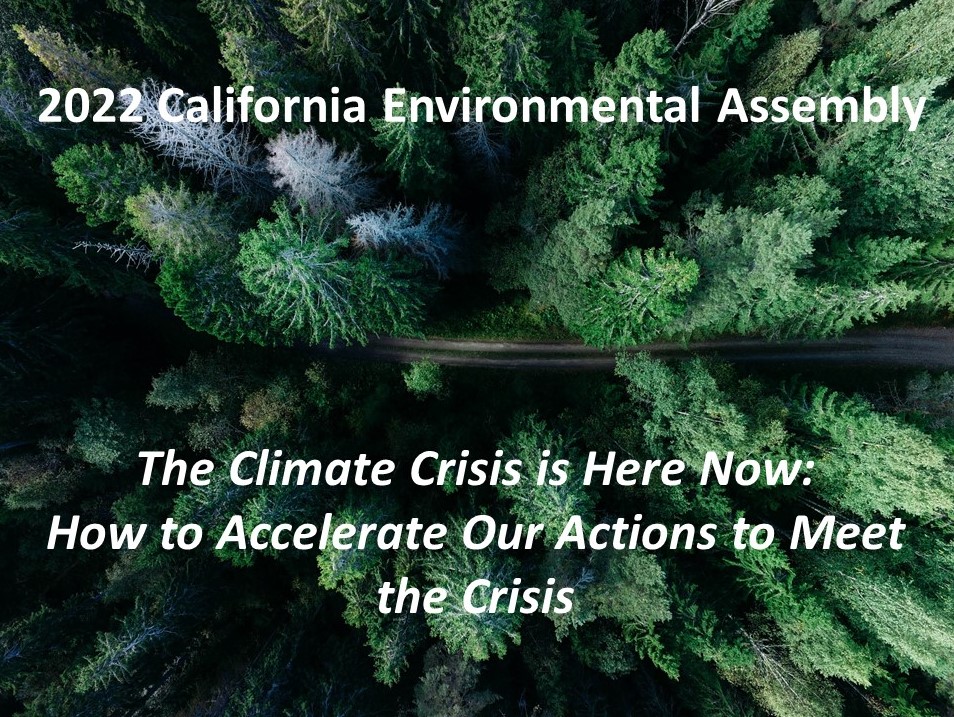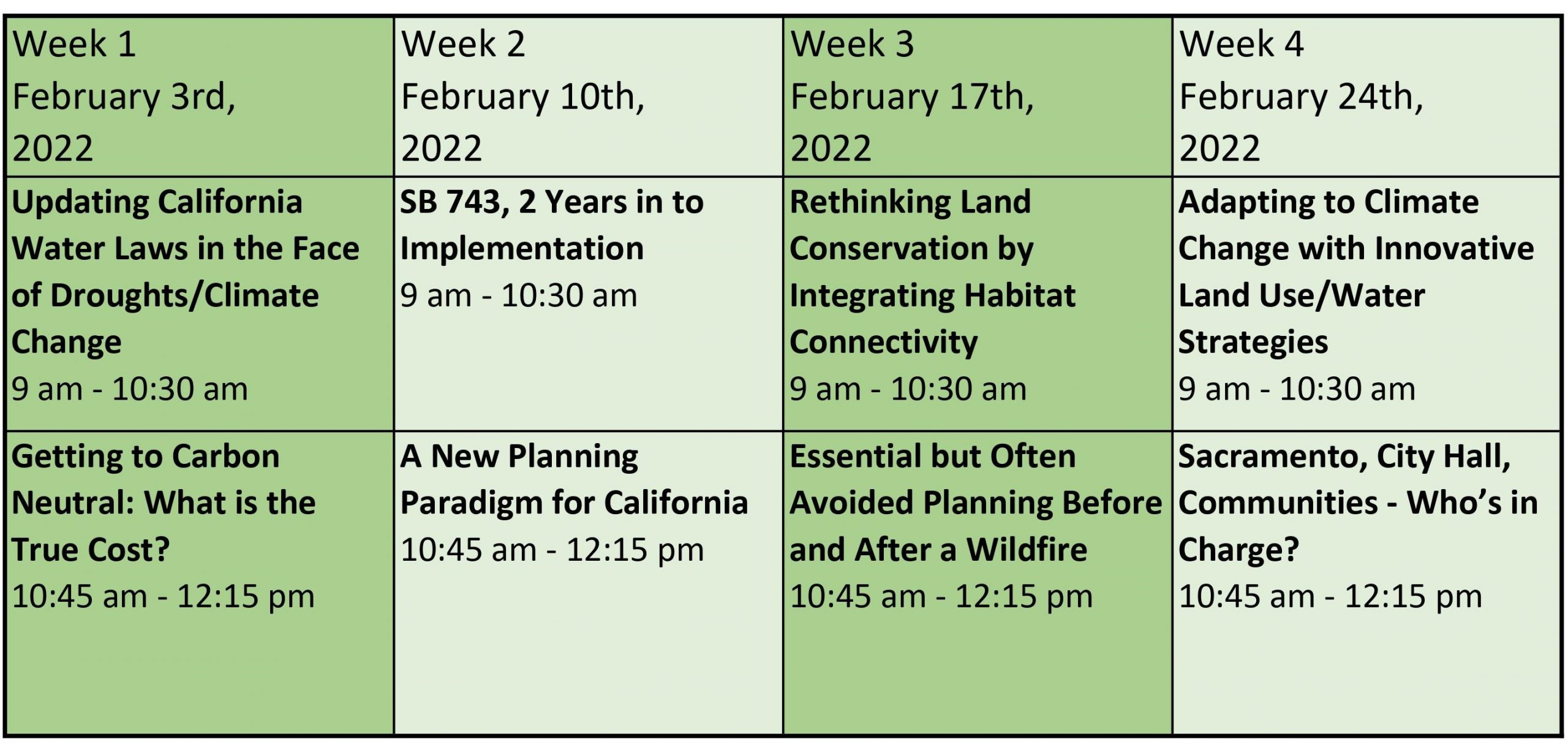2022 California Environmental Assembly Webinars
You’re Invited!
The last day of the 2022 California Environmental Assembly was February 24th, 2022.
Stay tuned for information about next year’s event!
What: Planning and Conservation League’s 2022 California Environmental Assembly
When: February 3rd, 10th, 17th, and 24th 2022
Where: Online. Zoom Links will be provided to registrants closer to the date of the Assembly.
The title of the 2022 Assembly is The Climate Crisis is Here Now: How to Accelerate Our Actions to Meet the Crisis. PCL strongly believes that immediate action is needed on many environmental issues, most importantly the climate crisis. Thus, we are designing our panels this year to discuss both short and long-term solutions and ways members of the public can help enact them. The sessions will focus on the topics of water, land use, transportation, CEQA/environmental litigation, habitat connectivity, and wildfire. The 2022 PCL Assembly will have a total of eight sessions held each Thursday in February. There will be two sessions a day, one starting at 9 am and one starting at 10:45 am.
2022 Assembly Schedule
2022 Assembly Program
2022 CALIFORNIA ENVIRONMENTAL ASSEMBLY
The Climate Crisis is Here Now: How to Accelerate Our Actions to Meet the Crisis
February 3rd - 24th, 2022
Session One: Updating California Water Laws in the Face of Droughts/Climate Change
California's current system of water laws is ill-equipped to respond to long term droughts/climate change. Already one million Californians do not have safe drinking water. California’s aquatic ecosystems are in crisis. The State’s water users are also confronting increasingly scarce and unpredictable water supplies.
Moderator - Jonas Minton, Senior Water Policy Advisor, Planning and Conservation League
Panelists
Dennis O'Connor, Chief Consultant, Senate Committee on Natural Resources and Water
Clifford T. Lee, former Deputy Attorney General, California Attorney General’s Office
Session Two: Getting to Carbon Neutral: What is the True Cost?
California has pledged to achieve carbon neutrality to limit rising global temperatures and the consequences of climate change. Achieving net zero emissions will require significant GHG reductions from California in the next twenty years and beyond.
Moderator - Douglas Carstens, Managing Partner, Chatten-Brown, Carstens & Minteer
Panelists
Rob Bonta, Attorney General, California Department of Justice
Veronica Eady, Senior Deputy Executive Officer of Policy and Equity, Bay Area Air Quality Management District
Eddie H. Ahn, Executive Director, Brightline Defense
Session Three: SB 743, 2 Years in to Implementation
SB 734, a law that mandated a new methodology for analyzing transportation impacts, was passed in 2013—and it has been fraught with debate ever since. The vehicle miles traveled-based methodology that was developed from that mandate has the potential to be one of the most effective policy levers we have now to change land use and transportation behavior in California. Yet, since these new regulations were finally implemented in 2020, jurisdictions across the state are still grappling with the execution of the law.
Moderator - Matthew Baker, Policy Director, Planning and Conservation League
Panelists
Eric Sundquist, Sustainability Advisor/SB 743 Program Manager, CalTrans
Mariah Thompson, Staff Attorney, Community Equity Initiative, California Rural Legal Assistance, Inc
Ramses Madou, Division Manager, Planning, Policy, and Sustainability, City of San Jose, Department of Transportation
Jamey Volker, Postdoctoral Researcher, UC Davis Institute of Transportation Studies
Session Four: A New Planning Paradigm for California
The fires and drought are getting worse, housing prices are skyrocketing, both VMT and disparities between rich and poor are rising at alarming rates. Meeting our housing needs in a way that will achieve our climate mandates, preserve our land and water, and address social inequities will require a fundamental shift in the way we employ our land use and transportation investments, and we just aren’t getting there fast enough.
Moderator - Matthew Baker, Policy Director, Planning and Conservation League
Panelists
Nailah Pope-Harden, Executive Director, ClimatePlan
Cathy Creswell, Principal, Creswell Consulting, and Former Director of the CA Dept. of Housing and Community Development
Louise Bedsworth, Land Use Program Director, UC Berkeley’s Center for Law, Energy, and the Environment, and Former Executive Director, Strategic Growth Council
Mike McKeever, Former Executive Director of the Sacramento Area Council of Governments (SACOG)
Session Five: Rethinking Land Conservation by Integrating Habitat Connectivity
One of the leading causes for the loss of biodiversity is habitat fragmentation. As more transportation infrastructure is constructed, wildlife is forced to cross large highways in search of new territory which is often deadly for both animals and drivers. The present scenario illustrates the need to invest in more wildlife corridors and crossings to protect California’s wildlife.
Moderator - Fran Pavley, Former California State Senator
Panelists
Beth Pratt, California Director, National Wildlife Federation
Mari Galloway, California Project Manager, Wildlands Network
John Donnelly, Executive Director, Wildlife Conservation Board
Session Six: Essential but Often Avoided Planning Before and After a Wildfire
Recurring and major wildfires are now a predictable and inevitable part of California’s future. This panel will discuss how, in the new project planning and approval stage, we can better prepare to protect people, homes and wildlife and what can be done after a wildfire has impacted natural open spaces and communities.
Moderator - Kate Dargan Marquis, Former California State Fire Marshal, California Fire Safe Council
Panelists
Peter Broderick, Urban Wildlands Legal Director, Senior Attorney, Center For Biological Diversity
Bob Roper, Former Fire Chief, Ventura County Fire Department
Dr. Brett Furnas, Senior Environmental Scientist, California Department of Fish and Wildlife
Dr. Kimiko Barrett, Research & Policy Analyst, Headwaters Economics
Session Seven: Adapting to Climate Change with Innovative Land Use/Water Strategies
Climate change is making atmospheric rivers more common while increasing the likelihood of droughts, and significantly reducing the holding capacity of the snowpack – a result of rising temperatures. Capturing flood and storm waters for groundwater recharge and storage can be a realistic, least-cost strategy for meeting water storage needs and reducing flood risks.
Moderator - Roger Dickinson, Policy Director, Local Government Commission
Panelists
Paul Gosselin, Deputy Director, California Department of Water Resources
Rosemary Knight, Professor of Geophysics, Stanford University
Julie Renter, President, River Partners
Session Eight: Sacramento, City Hall, Communities - Who’s in Charge?
The recent adoption of Senate Bills 8, 9 and 10 as on-going and new attempts to address the housing affordability crisis in California are part of a growing tension over state intervention in local housing policy.
Moderator - Kevin Johnson, Attorney and Founder, Kevin Johnson, A Professional Law Corporation
Panelists
Scott Weiner, California State Senator
Darrell Steinberg, Mayor of Sacramento,
Martha Dina-Arguello, Executive Director, Physicians for Social Responsibility
Sponsors
Gold Sponsors
Silver Sponsors
Bronze Sponsors
Center for Biological Diversity
Mogavero Architects, Inc.
Remy Moose Manley LLP
National Wildlife Federation
Environment Now
David Hirsch
Wittwer Parkin, LLP
Earthjustice
Mitchell M Tsai, Attorney at Law PC
Emerging Sponsors
M.R. Wolfe & Associates, PC
Kevin K. Johnson, APLC
Contributing Sponsors
Margie Kay
Andy Sawyer & Carol Bingham
Public Good PR
Friends, Artists, and Neighbors of Elkhorn Slough
Environmental Defense Center
Defenders of Wildlife
Law Office of Roger B. Moore
Monica Hunter


